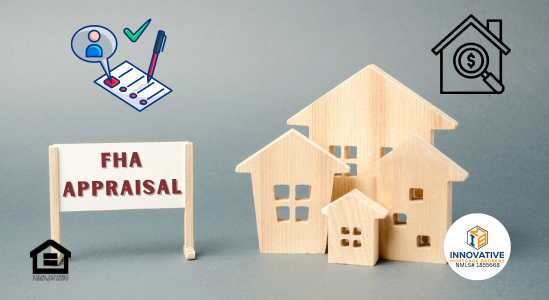Turning Rent into Equity Rent-to-own can work, but only when the paperwork is airtight. Lenders…
FHA Appraisals Made Simple: A Comprehensive Checklist for Homebuyers and Homeowners in Pennsylvania

When you’re buying a home with an FHA loan, the appraisal process is a crucial step. Unlike a traditional home appraisal that mainly focuses on determining the market value of a property, an FHA appraisal goes a step further to ensure that the home meets specific safety, livability, and structural standards set by the Federal Housing Administration (FHA). This added layer of protection ensures the home is not only valued correctly but is also in good enough condition to live in safely.
During an FHA appraisal, a licensed appraiser will inspect the home to confirm it complies with the FHA’s Minimum Property Requirements (MPR). These standards cover everything from the condition of the roof to the functionality of the utilities. If the property doesn’t meet these standards, certain repairs may need to be made before the loan can be approved. This process protects both the buyer and the lender, ensuring the home is in sound condition.
One important thing to note is that FHA appraisals are valid for six months. This means that once the property has been appraised and meets the FHA’s requirements, that appraisal will stay with the property for half a year. If the sale falls through or a new buyer comes along, the existing FHA appraisal can be used during that six-month window, saving time and money.
Understanding what goes into an FHA appraisal and what appraisers look for can help ensure a smoother homebuying process. Below is a detailed checklist to guide you through the essential requirements and make sure your property is FHA-ready.
General Property Eligibility
- Primary Residence: The property must be the borrower’s primary home. Investment properties and vacation homes are not eligible for FHA loans.
- Single-Family Homes: The property must be a single-family home, a 1-4 unit property, or an approved condominium or manufactured home.
Minimum Property Requirements (MPR)
- Safe and Secure: The home must be free of safety hazards and structurally sound. This includes everything from the foundation to the roof.
- Utilities: The property must have functioning heating, plumbing, and electrical systems.
- Heating: A permanent heating system must be in place. Space heaters or temporary systems do not qualify.
- Electricity: The home must have a fully functional electrical system without exposed wires or defective circuits.
- Water Supply: There must be access to clean, safe drinking water. Well water must meet local health standards.
- Sewage Disposal: The property must have a functional sewage disposal system. Homes with cesspools or non-conventional systems may require additional approval.
Property Condition
- No Major Defects: The home must be free of major structural defects, such as:
- Cracks or damage in the foundation
- Leaking roofs or severe water damage
- Rotting wood or termite damage
- Sagging floors or cracked walls
- Appliances: The kitchen must have a working stove. Other appliances, like a refrigerator or dishwasher, are not required but if present, must be in working condition.
- Windows and Doors: All windows and doors must open, close, and lock properly. Broken or missing windows and doors must be repaired.
- Walls and Floors: There should be no peeling paint, holes, or other major defects in the walls, ceilings, and floors.
Exterior of the Home
- Roof: The roof must be in good condition, with at least two more years of life expectancy. Major damage, leaks, or missing shingles must be repaired.
- Foundation: The home must have a stable foundation without significant cracks, moisture, or settlement issues.
- Crawl Spaces and Attics: Crawl spaces and attics should be dry and well-ventilated. Access must be available for inspection.
- Siding: The exterior walls must protect against moisture and be free from severe cracks, damage, or deterioration.
Safety Standards
- Smoke Detectors: Smoke detectors must be installed and functioning in all required areas, particularly near bedrooms.
- Stairs and Railings: Any stairs must have railings if necessary for safety. Loose or broken steps must be repaired.
- Lead-Based Paint: For homes built before 1978, there must be no peeling or chipping lead-based paint. If the appraiser finds defective paint surfaces, they must be corrected, especially if children under six will live in the home.
- Fire Hazards: The home must not have any open electrical hazards, exposed wiring, or unsafe outlets.
Environmental Hazards
- Flood Zones: If the property is in a flood zone, the borrower must obtain flood insurance. The appraiser must check if the home is in a Special Flood Hazard Area (SFHA).
- Site Contamination: The property should be free from environmental hazards like soil contamination, radon, asbestos, or other pollutants.
- Proximity to Hazards: The home must not be located near a hazardous site, such as a high-voltage power line, pipeline, or an unstable slope that could affect safety.
Lead-Based Paint (for homes built before 1978)
- Inspection Requirement: The appraiser will inspect for peeling, chipping, or deteriorating paint. If found, it must be repaired in a safe manner.
- Children’s Exposure: The FHA is particularly concerned about homes where children under six will live, due to the risks of lead poisoning.
Access and Location
- Access to the Property: The property must have safe, legal, and permanent access from a public or private street. This means there must be a driveway, walkway, or roadway that provides entry.
- Proximity to Amenities: While the property does not need to be in a city or town, it should have reasonable access to essential amenities like schools, shopping, and medical services.
Property Types Eligible for FHA Financing
- Single-Family Homes: The most common property type. Can include detached homes or attached homes like townhouses.
- 1-4 Unit Properties: FHA loans are available for multi-family homes up to four units, as long as the borrower lives in one of the units.
- Manufactured Homes: Manufactured homes must be permanently affixed to a foundation and meet HUD standards.
- Condominiums: Condominiums must be part of an FHA-approved complex, and the unit itself must meet FHA standards.
Appraisal Report Requirements
- Comparable Sales: The appraiser must provide at least three recent comparable sales to justify the home’s market value. These sales should have occurred within the past six months and be similar in size, age, and location.
- Floor Plan: The appraiser will verify the total square footage and the layout of the home to ensure it matches local market conditions.
- Photos: The appraiser must include photos of the home’s interior and exterior, highlighting both its condition and any problem areas.
Special Requirements for FHA Appraisal
- Utilities Must Be On: For the appraiser to inspect the plumbing, heating, and electrical systems, utilities must be turned on at the time of appraisal.
- Repairs Needed Before Closing: If the appraiser identifies any required repairs to meet FHA standards, these must be completed before the loan is approved. In some cases, repairs can be completed post-closing if funds are placed in escrow to cover the costs.
Final FHA Appraisal Decision
- Pass or Fail: After the appraisal, the appraiser will issue one of the following:
- “As Is”: No repairs are needed, and the home qualifies as-is.
- “Subject To”: The home qualifies, but repairs are required before closing.
- “Rejection”: The property does not meet FHA standards, and repairs are either too extensive or costly.
Repairs and Re-Inspection
- Minor Repairs: If minor repairs are required (like replacing a broken window), these must be completed before the loan can close.
- Major Repairs: For significant issues (like a new roof), repairs may require a follow-up inspection by the appraiser to ensure they’ve been properly completed.
Conclusion
By understanding the FHA appraisal process and ensuring your property meets the necessary standards, you can avoid delays and unexpected surprises. Whether you’re a buyer or a seller, being prepared for the appraisal can help make the transaction smoother. Keep in mind that the FHA’s goal is not only to protect the lender but also to ensure the home is a safe and stable place for you and your family.
With the FHA appraisal valid for six months, you have peace of mind knowing that even if things don’t go as planned initially, the hard work of the appraisal can carry over to the next buyer if needed. Following this checklist will help you stay on top of the requirements and ensure your property is up to FHA standards, bringing you one step closer to completing your home purchase or sale with confidence.
At Innovative Mortgage Brokers, we are dedicated to making the mortgage process simple and stress-free for properties in Pennsylvania (PA) and Florida (FL). With over 15 years of experience, we specialize in finding tailored solutions for homebuyers and homeowners alike, whether you’re purchasing your first home, refinancing, or investing. We pride ourselves on providing personalized service, leveraging our deep connections and expertise to guide you through every step with transparency and care. At the heart of our business is a commitment to helping you achieve your homeownership goals with confidence in in Pennsylvania (PA) and Florida (FL).




